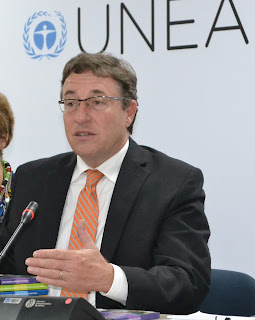By Protus Onyango
NAIROBI, Kenya (PAMACC News) - Calls for paradigm shift, a united approach, more funding and ratification of
the Paris Agreement to tackle global environmental degradation dominated the
high-level session of the UN Environmental Assembly (UNEA 2) yesterday.
Kenya's President Uhuru Kenyatta while officially opening the high-level segment attended by ministers and high-level representatives of over 170 governments, stressed the need for partnerships to address effects of climate change.
"For the past two decades, we have seen a movement emerge across the world that protecting the environment cannot be a tertiary matter. We must make sacrifices now to leave our children a viable tomorrow," Uhuru said.
Kenya's President Uhuru Kenyatta while officially opening the high-level segment attended by ministers and high-level representatives of over 170 governments, stressed the need for partnerships to address effects of climate change.
"For the past two decades, we have seen a movement emerge across the world that protecting the environment cannot be a tertiary matter. We must make sacrifices now to leave our children a viable tomorrow," Uhuru said.












